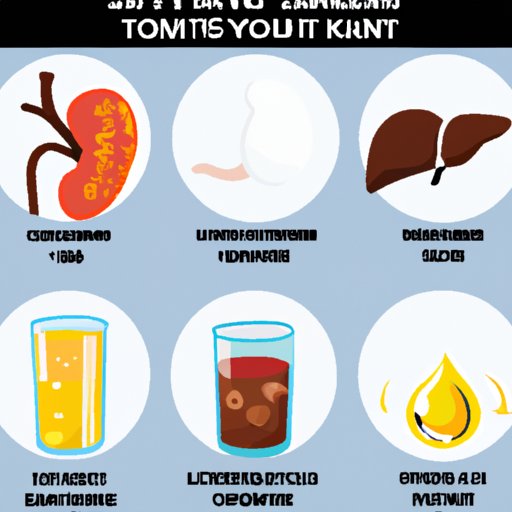Introduction
Your kidneys are essential organs that play an important role in maintaining your overall health and wellbeing. They filter waste from the blood and produce hormones that regulate blood pressure and red blood cell production. It is important to take care of your kidneys by making certain lifestyle changes in order to keep them healthy and functioning properly.
Maintain a Healthy Weight
One of the most important things you can do to keep your kidneys healthy is to maintain a healthy weight. Being overweight or obese increases your risk of developing kidney disease and other chronic health conditions. Maintaining a healthy weight can help reduce this risk.
Benefits of staying within a healthy weight range include improved energy levels, better sleep, and reduced risk of developing chronic diseases. Tips for maintaining a healthy weight include eating a balanced diet, limiting processed and sugary foods, and exercising regularly.
Exercise Regularly
Regular physical activity is essential for kidney health. Exercise can improve circulation, which helps the kidneys filter out waste more efficiently. Exercise also helps reduce stress and can prevent obesity, both of which can lead to kidney damage.
Benefits of regular exercise include improved mood, increased strength and endurance, and decreased risk of developing chronic diseases. Examples of exercises that are beneficial for kidney health include walking, jogging, cycling, swimming, and yoga.
Limit Your Salt Intake
Too much salt can increase your risk of developing high blood pressure, which can put strain on the kidneys and lead to kidney damage. Limiting your salt intake can help protect your kidneys and reduce your risk of developing hypertension.
Reasons why you should limit your salt intake include reducing your risk of developing high blood pressure, improving your heart health, and preventing water retention. Tips for reducing your salt intake include reading nutrition labels, avoiding processed and pre-packaged foods, and using herbs and spices instead of salt to flavor your meals.
Drink Plenty of Fluids
Staying hydrated is important for optimal kidney function. When you are dehydrated, your body is unable to flush out toxins and wastes as effectively, which can lead to kidney damage. Drinking plenty of fluids helps to keep your kidneys functioning properly.
Reasons for drinking plenty of fluids include increasing urine production, flushing out toxins, and preventing dehydration. Guidelines for how much fluid to drink vary depending on your age and activity level, but the general recommendation is to drink 8-10 glasses of water per day.
Avoid Smoking and Alcohol
Smoking and drinking alcohol can have negative effects on your kidneys. Smoking increases your risk of developing chronic kidney disease, while excessive alcohol consumption can cause dehydration and damage the delicate tissues in the kidneys.
Health risks associated with smoking and alcohol include increased risk of developing chronic diseases, damage to the kidneys, and increased risk of infection. Alternatives to smoking and drinking include exercising, meditating, and spending time with friends and family.
Eat a Balanced Diet
Eating a balanced diet is essential for maintaining healthy kidneys. A balanced diet includes a variety of fruits and vegetables, whole grains, lean proteins, and healthy fats. Eating a balanced diet can help reduce your risk of developing kidney disease and other chronic health conditions.
Benefits of eating a balanced diet include increased energy, improved digestion, and reduced risk of developing chronic diseases. Examples of foods that are beneficial for kidney health include leafy greens, berries, nuts and seeds, beans, and fatty fish.
Take Prescribed Medications as Directed
If you have been prescribed medications for a kidney-related condition, it is important to take them as directed. Taking medications as prescribed can help reduce your risk of developing complications and can help keep your kidneys healthy and functioning properly.
Benefits of taking prescribed medications as directed include reduced risk of complications, improved symptoms, and improved quality of life. Tips for remembering to take your medications include setting reminders, asking a friend or family member to remind you, and keeping your medications in a visible location.
Conclusion
Maintaining healthy kidneys is essential for your overall health and wellbeing. In order to keep your kidneys healthy, it is important to make certain lifestyle changes such as maintaining a healthy weight, exercising regularly, limiting your salt intake, avoiding smoking and alcohol, drinking plenty of fluids, eating a balanced diet, and taking prescribed medications as directed.
By following these tips, you can ensure that your kidneys stay healthy and functioning properly. Remember, even small changes can make a big difference when it comes to protecting your kidneys and your overall health.
(Note: Is this article not meeting your expectations? Do you have knowledge or insights to share? Unlock new opportunities and expand your reach by joining our authors team. Click Registration to join us and share your expertise with our readers.)
